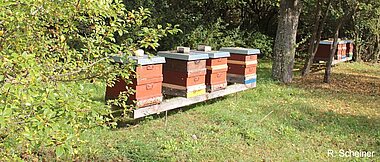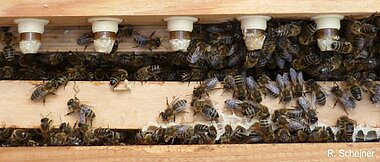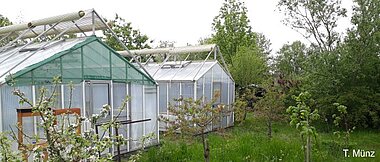Bee station
The bee station of the University of Würzburg is one of the few institutions in Germany where honeybees are exclusively maintained for research. It is part of the Chair of Behavioral Physiology and Sociobiolgy and is scientifically supervised by Prof. Dr. Ricarda Scheiner since April 2015.
In our research we investigate a variety of questions on the basic mechanisms of honeybee behavior. For this we employ diverse methods ranging from neuroanatomy, electrophysiology and behavioral physiology to molecular biology and biochemistry.
The bee station provides optimal conditions for research. We keep around 50 honeybee colonies in our bee garden of more than 3,000 m2 and in close proximity to Würzburg. The bees are carefully looked after by our beekeeper Dirk Ahrens. He is actively involved in the breeding program AG Toleranzzucht, which is a joined project of German beekeepers. The aim of this program is to increase the resistance of honeybees against the Varroa mite.
For our research, we employ colonies of normal age structure and small colonies of only 1-3 age cohorts. This way we can dissociate effects of age and social role on behavior. Further, we use artificial insemination of queens for specific questions
In addition to behavioral physiological laboratories and behavioral biological laboratories our bee station provides modern office rooms and a seminar room for up to 15 people. Students are welcome to gain lots of practical expertise and excellent insight into current honeybee research. We further provide informative courses for school teachers, kindergarten groups and school classes.
Even though we primarily maintain our honeybee colonies for research, the bees produce excellent honey, which can be purchased from the bee station.








